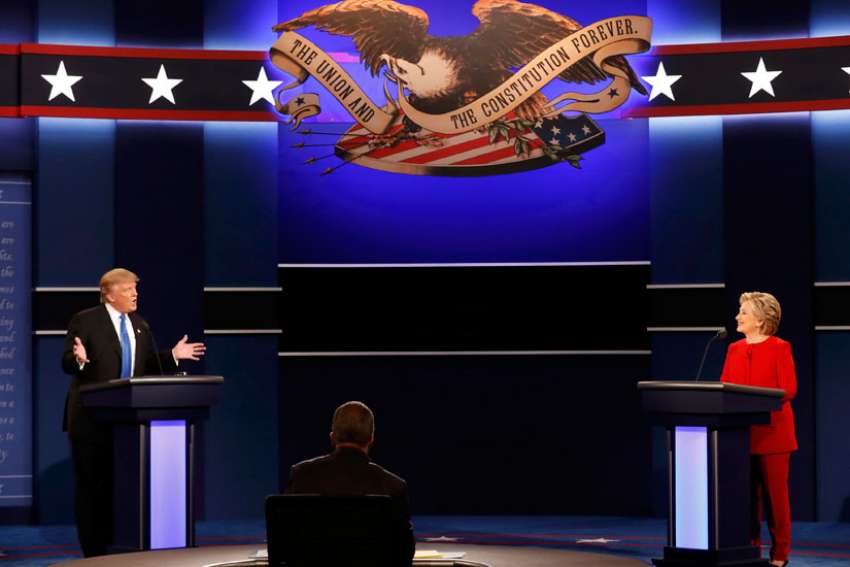Some bishops have expressed public dismay at the poor quality of both major candidates, Republican Donald Trump and Democrat Hillary Clinton.
Bishop Nicholas DiMarzio of Brooklyn, New York, put it bluntly: “The political climate in the United States is chaotic and dispiriting. The presidential nominees of both major political parties seem scandal-plagued and corrupt. America deserves better but perhaps these two contenders for our nation’s highest political office are simply a reflection of the citizenry.”
Or as Philadelphia Archbishop Charles J. Chaput wrote: “Both candidates for the nation’s top residence, the White House, have astonishing flaws.”
Chaput went on to say: “This is depressing and liberating at the same time. Depressing, because it’s proof of how polarized the nation has become. Liberating, because for the honest voter, it’s much easier this year to ignore the routine tribal loyalty chants of both the Democratic and Republican camps.”
Archbishop William E. Lori of Baltimore urged Catholics to form their consciences rightly and seek the common good, not simply pursue a partisan agenda. “The common good is not identifiable with any party platform or ideology. Catholics should be guided more by our moral convictions than by our attachment to a political party or interest group,” he said.
Cardinal Donald W. Wuerl of Washington believes it is not the place of clergy to dictate who to vote for or to intervene directly into the political process. In a column in his archdiocesan newspaper Wuerl wrote: “Each year in which we move toward a national election, I remind my brother priests that we are in the pulpit as proclaimers of the Gospel, not as political leaders. No one elected us as their political representative and there might be serious reason to believe they probably would not.”
Archbishop Joseph F. Naumann of Kansas City lamented the quality of the candidates in a column in The Leaven, the archdiocesan newspaper.
“This presidential election presents all Americans with a difficult choice,” he wrote. “Both major political parties have nominated very flawed candidates. I encourage you to think not only of the candidate, but who they will appoint to key cabinet and other powerful government positions if he or she becomes president. We are choosing not just a president, but an entire administration.”
Writing in Angelus, the online news outlet for the Archdiocese of Los Angeles, Archbishop Jose H. Gomez noted that many issues facing the country have not really been discussed — from abortion and racial injustice to homelessness to the death penalty and growing support for euthanasia and assisted suicide.
“At the heart of the discontent in American life, I see a confusion about the human person … We don’t know what it means to be a human person. Democracy cannot stand without a proper understanding of the human person.”
Cardinal-designate Joseph W. Tobin of Indianapolis has written frequently about the election.
“The bishops do not tell us whom to vote for, but they do advise us on the moral principles that must be applied to each major issue,” he wrote. “Then it’s up to us to study the positions of candidates and the platforms of political parties, and determine where they stand in relationship to fundamental moral values … An informed conscience is one that looks beyond political correctness and the ideologies of the left and the right to find the truth.”
The bishops of Minnesota recorded a video message that urged voters to “stop complaining and start praying. Use our election day novena to prayerfully prepare yourself for faithful citizenship on Nov. 8 and beyond.”
In Vermont, Bishop Christopher J. Coyne of Burlington encouraged Catholics to get out and vote. “We must exercise that right to vote and have our voices heard. Secondly, I ask that as people of faith we not leave that faith in Jesus Christ and in His Church at the door of the voting booth but allow that faith to inform the choices we make in that booth.”
Bishop William F. Murphy of Rockville Centre, N.Y., in a letter to Catholics, lamented the “mean-spiritedness and intolerance” that pervades the political climate.
“If you think you are confused and slightly battered by the noise, public protests and private misgivings you have every reason to be so,” Murphy said. “But as responsible citizens and faithful men and women of God, we have to exercise our right to vote in a way that is serious, well-informed and reflective of who we are as Americans and Catholics.”


